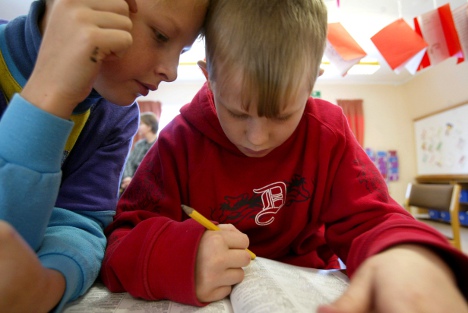There has been a huge focus on school results and teacher training from all parties since Sweden tumbled in international school rankings earlier this year.
In the latest pre-election surveys, Swedish voters made schools their top concern ahead of the vote on Sunday.
On Tuesday, the governing Alliance announced that students could be stopped from bringing their cell phones into class if it wins the election.
Teachers have had the right to take phones away from pupils since 2007, if they are disrupting lessons. But staff are not currently able to confiscate phones in advance, if they anticipate that the devices will cause problems.
Liberal Party leader and Education Minister Jan Björklund said the Alliance wanted to help students "who do not concentrate on lessons because they are playing on their phones or are active on social media".
"Teachers need to get new powers to determine that you can not have cell phones in class", he added.
He proposed that staff should get have the right to collect cell phones at the beginning of each lesson and then give them back when the lesson is over.
The Left Party's education policy spokesperson Rossana Dinamarca criticized the proposal, saying that confiscating the devices would "give teachers a kind of policing role that does not belong in schools".
She argued that teachers should work to give mobiles and tablets a greater role in classrooms, since young people are so used to using these kind of devices.
The Social Democrats said that they supported the idea of removing mobile phones if they were disrupting teaching, but accused the Alliance of creating a "symbolic" policy that would not help deal with declining school performance.
"We must invest in smaller classes, more special education teachers and additional resources for the school," said spokesperson Ibrahim Baylan.

Meanwhile the debate over publicly-funded, privately-owned "free schools", continues in Sweden.
Since the introduction of a school voucher system in the 1990s — allowing students to attend public or private schools cost-free, even outside their locality — privately-owned schools have grown steadily. A quarter of Swedish primary school students and a third of upper secondary students now attend one.
Free schools grew six times faster than council-run schools between 2011 and 2013.
Unlike their equivalents in other countries such as the UK – ironically modeled on the Swedish system – Sweden's free schools are allowed to make profits.
Some critics argue that free schools have contributed to segregation by plundering council-run schools of the brightest students and teachers.
"When they were introduced there were hopes that they would allow poorer students to move to better schools and even lead to the flowering of new pedagogical methods," said Magnus Oskarsson, who led the Pisa research in Sweden.
"But we can see today… that this has failed."
Sweden elections: Who's who in politics?
The Social Democrats have promised stricter regulations and the Left Party – whose support they may need to form a government – demand an outright ban on profits.
Claes Nyberg of the Swedish Association of Independent Schools denied that free schools were the reason for falling grades.
"All systems will have segregation effects… school choice is something that lessens that," he said, arguing that when pupils choose schools actively it narrows educational gaps.
"What really drives results is the situation in the classroom. There needs to be more focus on getting the right people into the profession."
Although a 2011 reform made it harder to recruit unqualified staff, more than 20 percent of Swedish teachers lack a teaching qualification and about 50 percent teach subjects they never trained in, according to the national education agency.
"There's a very high percentage of teachers who are not qualified… which gives another important clue to why we have falling results," said the agency's director Anna Ekström.
Both the ruling Alliance and the red-green opposition have promised salary hikes for teachers to encourage more to join the profession and tackle a growing shortage — estimated to reach up to 50,000 by 2020, according to the national teachers' union.
"If you look at the European league tables for teaching salaries, Sweden is at the bottom," said Eva-Lis Siren at the teachers' union, "and young people are saying 'no thanks, the pay is too low'."
"Politicians are suggesting things like smaller classes, more special-needs teachers and so on. But where are they going to come from?"
"We'll either have more unqualified teachers or bigger classes. And if we have a problem now it's nothing like what it's going to be in another five years."

 Please whitelist us to continue reading.
Please whitelist us to continue reading.
Member comments